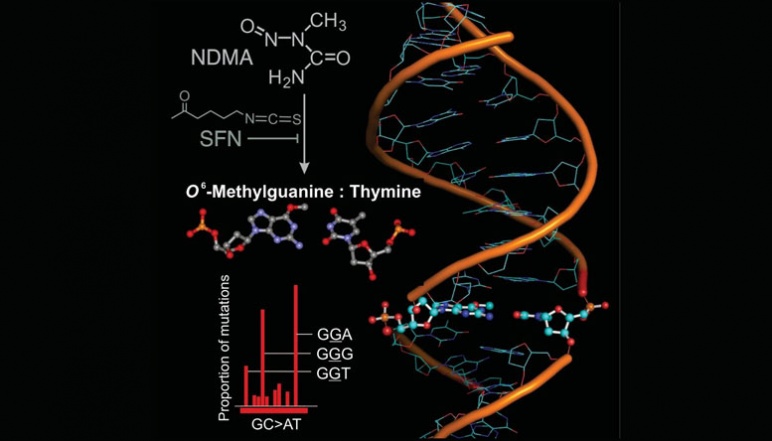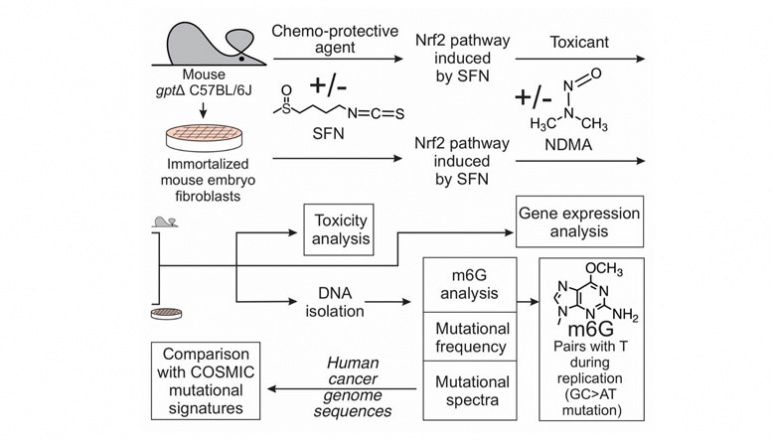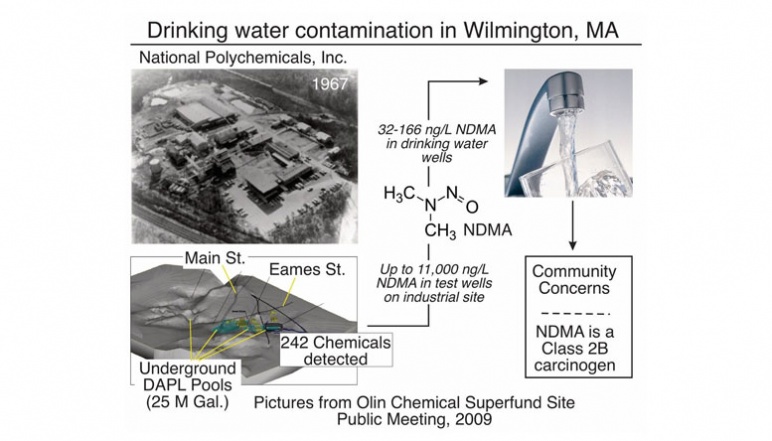Our Research Reduction of risk from water- and food-borne N-nitrosamines by induction of the Nrf2 chemo-protective pathway in mammals

Graphical summary of the project. Disruption of the pathway by which the environmental toxicant NDMA causes clinical disease. Credit: John Essigmann drew this figure.

Explicit workplan of the project. Work plan for evaluating the Nrf2 inducer sulforaphane (SFN) as a chemo-protective agent against the toxicological effects of NDMA in mice and in an isogenic cell line derived from the parental mouse strain. Credit: John Essigmann drew this figure.

Motivation for the project. History of the Olin Superfund Site that led to contamination of drinking water with NDMA. Credit: John Essigmann drew this figure.
Principal Investigator
John Essigmann
- William R. & Betsy P. Leitch Professor in Residence Professor of Chemistry, Toxicology, and Biological Engineering
- Center for Environmental Health Science
- Department of Biological Engineering
John Essigmann is a professor of biological engineering, chemistry and toxicology in the MIT Department of Biological Engineering. He was trained in toxicology at MIT and later became Associate Head of the Department of Chemistry, Director of the Center for Environmental Health Sciences and Director of the MIT T32 Training Program in Toxicology. His expertise focuses on the responses of cells to DNA damaging agents.
Research Strategy
- Target the Nrf2 pathway to reduce the level of mutations caused by N-nitroso-dimethylamine (NDMA)
- Use high-resolution mutational spectrometry to probe the mechanism by which Nrf2 pathway inducers reduces the anticipated mutational burden of NDMA
- Determine if induction of the Nrf2 pathway results in diminished mutation induction
- Use bioinformatics tools to determine if NDMA mutational patterns resemble mutational patterns previously observed in human cancer data banks
Project description
Cancer is a genetic disease. Most cancers are triggered by mutations caused by carcinogens (e.g., sunlight and chemicals from the environment) that damage our DNA. Research studies are showing how food and beverages—including drinking water—carry higher levels of carcinogens that previously thought, with longstanding negative health effects. The presence of carcinogens in water and food is often caused by environmental contamination from manufacturing or other industrial processes. While there are many efforts to reduce the production of these chemicals or remove them from the environment, this J-WAFS-funded seed grant project will take a new approach.
After being consumed, most carcinogenic chemicals require some kind of metabolization to a DNA-reactive before they can react with the genome and induce mutations. This project proposal will focus on the Nrf2 pathway of gene expression that, when induced, will destroy DNA-reactive forms of chemical carcinogens. Induction of this pathway is proposed to reduce the mutational burden of a specific chemical carcinogen called N-nitroso-dimethylamine (NDMA), which is present in polluted waters and in processed foods.
Outcomes
- Identified two biomarkers associated with human exposure to NDMA
- Used one of the biomarkers to sensitively measure a portion of the NDMA molecule bonded to DNA and used the other biomarker to discover that the NDMA mutational fingerprint appears shortly after exposure to the carcinogen
- Treated mice with a chemical called sulforaphane (SFN), which is abundant in cruciferous vegetables such as broccoli, and learned it can induce a series of biochemical pathways that could possibly protect humans from the carcinogenic NDMA
Additional Details
Impact Areas
- Water
- Food
Research Themes
- Sensors & Monitoring
- Equity & Access
Year Funded
- 2020
Grant Type
- Seed Grant
Status
- Completed
